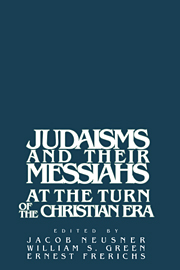Book contents
- Frontmatter
- Contents
- Preface
- List of Contributors
- 1 Introduction: Messiah in Judaism: Rethinking the Question
- 2 Wisdom Makes a Difference: Alternatives to “Messianic” Configurations
- 3 Salvation without and with a Messiah: Developing Beliefs in Writings Ascribed to Enoch
- 4 How the Authors of 1 and 2 Maccabees Treated the “Messianic” Promises
- 5 Messianism in the Maccabean Period
- 6 Waiting for the Messiah: The Spiritual Universe of the Qumran Covenanters
- 7 Philo and Messiah
- 8 Messiah and Gospel
- 9 Christology in Mark's Gospel
- 10 The Question of the Messiah in 4 Ezra
- 11 From Jewish Messianology to Christian Christology: Some Caveats and Perspectives
- 12 Mishnah and Messiah
- General Index
- Index to Biblical and Hermeneutical Texts
11 - From Jewish Messianology to Christian Christology: Some Caveats and Perspectives
Published online by Cambridge University Press: 08 January 2010
- Frontmatter
- Contents
- Preface
- List of Contributors
- 1 Introduction: Messiah in Judaism: Rethinking the Question
- 2 Wisdom Makes a Difference: Alternatives to “Messianic” Configurations
- 3 Salvation without and with a Messiah: Developing Beliefs in Writings Ascribed to Enoch
- 4 How the Authors of 1 and 2 Maccabees Treated the “Messianic” Promises
- 5 Messianism in the Maccabean Period
- 6 Waiting for the Messiah: The Spiritual Universe of the Qumran Covenanters
- 7 Philo and Messiah
- 8 Messiah and Gospel
- 9 Christology in Mark's Gospel
- 10 The Question of the Messiah in 4 Ezra
- 11 From Jewish Messianology to Christian Christology: Some Caveats and Perspectives
- 12 Mishnah and Messiah
- General Index
- Index to Biblical and Hermeneutical Texts
Summary
Jews often assume a Christian is one who claims that Jesus was the Messiah. They rightly see the problems involved in such a belief, but they fail to note that from the beginning until the present those who follow Jesus have expressed their beliefs by employing a wide range of terms or titles that are often interpreted with considerable freedom, a fact which frequently seems astounding to an outsider.
Christians often claim that Jesus' followers knew he was the Messiah, a well known concept in Judaism, and that Christianity obtained its eponymous cognomen from the conviction and proclamation that Jesus was the Christ. They rightly discern that very early in the first century, indeed by the time of Paul's epistles, Jesus of Nazareth was known as Jesus Christ, but they fail to perceive the abundant misunderstandings in the way their claim is articulated. They will be surprised to learn that none of the creeds, especially those recited in unison Sunday morning, contains the confession that Jesus is the long-expected Messiah.
The present chapter in this important book, which should help turn the tide of understanding regarding messianism, seeks to illustrate how difficult it is to move from a first-century Jewish belief in the Messiah to a Christian confession in Jesus' messiahship. The phrase “the Jewish belief” is itself, as we shall see, problematic, yet it is facilely defined by excellent scholars as the contention that at the end of time, or near it, God will send his Messiah, or Anointed One, to restore the harmony of Eden.
- Type
- Chapter
- Information
- Judaisms and their Messiahs at the Turn of the Christian Era , pp. 225 - 264Publisher: Cambridge University PressPrint publication year: 1988
- 1
- Cited by



